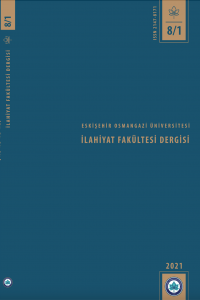Abstract
Solakzâda Mahmad Hamdamî is a historian, poet and composer who lived in Istanbul in the 17th century. Solakzâda, about which we know very little, is known with the pseudonym "Hamdamî" in his poems and "Miskali" in music. Solakzâda, who showed an interest in history books since his childhood, is also the author of the work named Nawadir al-wuku, written with the encouragement of Hasodabashı Hasan Aga. The history of Solakzâda, which includes the military and political events that took place from the foundation of the Ottoman Empire until the death of Sultan Ahmed I. It is the summary of Mehmed's works named Nuhbat al-tawhari. The work, which is far from originality because the author conveyed his sources exactly, was described as the most useful extract written on Ottoman History by Joseph Von Hammer. The information provided by Solakzâda in the History of Solakzâda shed light on the Ottoman history and was the source of the Ottoman histories that were later compiled. While copying his work, he supported the events he told using verses, hadiths, proverbs and poems according to the importance of the subject with religious sources. This situation shows that Solakzâda has a great command of religious and historical knowledge.
References
- Bursalı Mehmed Tahir. Osmanlı Müellifleri. 3 Cilt. İstanbul: Matbʿa-i ʿĀmire, 1342.
- Celâlzāde Mustafa. Selim-nāme. nşr. Ahmet Uğur- Mustafa Çuhadar, Ankara: Kültür Bakanlığı Yayınları, 1990.
- Hoca Sadeddin Efendi. Tācu’t-Tevārīḫ. 2 Cilt. İstanbul: Matbʿa-i ʿĀmire, 1279.
- Kur’ān-ı Kerim Meāli, çev. Hayrettin Karaman vd. Ankara: Türkiye Diyanet Vakfı Yayınları, 2004.
- Karslızāde Cemāleddin Mehmed, Osmanlı Tārih ve Müverrihleri: Āyīne-i Zurefā, nşr. Mustafa Arslan. İstanbul: Kitabevi Yayınları, 2003.
- Lokmacı, Süleyman. “Solakzāde Tarihi”, Atatürk Üniversitesi Türkiyāt Araştırma Enstitüsü Dergisi 63 (Eylül 2018), 514-531.
- Mustafa Safâyî Efendi. Tezkire. nşr. Pervin Çapan. Ankara: Atatürk Kültür Merkezi Yayınları, 2005.
- Özcan, Abdulkadir. “Solakzāde Mehmed Hemdemī”. Diyanet İslām Ansiklopedisi. 37/370-372. İstanbul: Türkiye Diyanet Vakfı Yayınları, 2009.
- Özergin, M. Kemal. “Solakzāde Mehmed Hemdemī”. MEB İslām Ansiklopedisi. 10/748-749. İstanbul: Milli Eğitim Bakanlığı Basımevi, 1998.
- Pakalın, Mehmet Zeki. Tarih Deyimleri ve Terimleri Sözlüğü. 3 Cilt. İstanbul: Milli Eğitim Bakanlığı Yayınları, 1993.
- Solakzāde Mehmed Hemdemī Efendi. Tārīh-i Solakzāde. İstanbul: Mahmut Bey Matbaası 1297.
- Uzunçarşılı, İsmail Hakkı. Kapıkulu Ocakları. Ankara: Türk Tarih Kurumu Basımevi, 1943.
Abstract
Solakzâde Mehmed Hemdemî XVII. yüzyılda İstanbul’da yaşamış tarihçi, şair ve bestekârdır. Hakkında fazla bilgi sahibi olmadığımız Solakzâde, yazdığı şiirlerinde “Hemdemî”, musiki de ise “Miskalî” takma adı ile tanınmıştır. Çocukluğundan itibaren tarihe ve tarih kitaplarına büyük ilgi gösteren Solakzâde, Hasodabaşı Hasan Ağa’nın yönlendirmesi ile Nevâdirü’l Vuku’ adlı eseri yazmıştır. XVII. yüzyıl Osmanlı Tarihi ile ilgili kıymetli eserlerin yazıldığı bir dönem olmuştur. Solakzâde de kendi adını taşıyan Solakzâde Tarihi adını verdiği eserinde, Osmanlı Devleti’nin kuruluşundan Sultan I. Ahmed’in ölümüne kadar meydana gelen askerî ve siyasî olayları ele almıştır. Solakzâde Tarihi, Hoca Sadeddin Efendi’nin Tacü’t Tevârih’i, Gelibolulu Mustafa Ali’nin Künhü’l Ahbar’ı ve Edirneli Mehmed b. Mehmed’in Nuhbetü’t Tevârîh isimli eserlerinin bir icmalidir. Bu sebeple olaylar, yazarın yararlandığı kaynaklardaki gibidir. Solakzâde’nin verdiği bilgiler, Osmanlı Tarihi’ne ışık tutmuş ve daha sonra telif edilen Osmanlı tarihlerine kaynaklık etmiştir. O, eserini telif ederken konunun önemine göre ayet, hadis, atasözleri ve şiirler kullanarak anlattığı olayları dini kaynaklarla desteklemiştir. Bu durum Solakzâde’nin dinî ve tarihî bilgiler konusuna çok hâkim olduğunu göstermektedir.
References
- Bursalı Mehmed Tahir. Osmanlı Müellifleri. 3 Cilt. İstanbul: Matbʿa-i ʿĀmire, 1342.
- Celâlzāde Mustafa. Selim-nāme. nşr. Ahmet Uğur- Mustafa Çuhadar, Ankara: Kültür Bakanlığı Yayınları, 1990.
- Hoca Sadeddin Efendi. Tācu’t-Tevārīḫ. 2 Cilt. İstanbul: Matbʿa-i ʿĀmire, 1279.
- Kur’ān-ı Kerim Meāli, çev. Hayrettin Karaman vd. Ankara: Türkiye Diyanet Vakfı Yayınları, 2004.
- Karslızāde Cemāleddin Mehmed, Osmanlı Tārih ve Müverrihleri: Āyīne-i Zurefā, nşr. Mustafa Arslan. İstanbul: Kitabevi Yayınları, 2003.
- Lokmacı, Süleyman. “Solakzāde Tarihi”, Atatürk Üniversitesi Türkiyāt Araştırma Enstitüsü Dergisi 63 (Eylül 2018), 514-531.
- Mustafa Safâyî Efendi. Tezkire. nşr. Pervin Çapan. Ankara: Atatürk Kültür Merkezi Yayınları, 2005.
- Özcan, Abdulkadir. “Solakzāde Mehmed Hemdemī”. Diyanet İslām Ansiklopedisi. 37/370-372. İstanbul: Türkiye Diyanet Vakfı Yayınları, 2009.
- Özergin, M. Kemal. “Solakzāde Mehmed Hemdemī”. MEB İslām Ansiklopedisi. 10/748-749. İstanbul: Milli Eğitim Bakanlığı Basımevi, 1998.
- Pakalın, Mehmet Zeki. Tarih Deyimleri ve Terimleri Sözlüğü. 3 Cilt. İstanbul: Milli Eğitim Bakanlığı Yayınları, 1993.
- Solakzāde Mehmed Hemdemī Efendi. Tārīh-i Solakzāde. İstanbul: Mahmut Bey Matbaası 1297.
- Uzunçarşılı, İsmail Hakkı. Kapıkulu Ocakları. Ankara: Türk Tarih Kurumu Basımevi, 1943.
Details
| Primary Language | Turkish |
|---|---|
| Subjects | Religious Studies |
| Journal Section | Compositions |
| Authors | |
| Publication Date | March 15, 2021 |
| Submission Date | November 26, 2020 |
| Acceptance Date | January 18, 2021 |
| Published in Issue | Year 2021 Volume: 8 Issue: 1 |
Journal of Eskisehir Osmangazi University Faculty of Theology (ESOGUIFD) is licensed under a Creative Commons Attribution Non-Commercial 4.0 International license.


